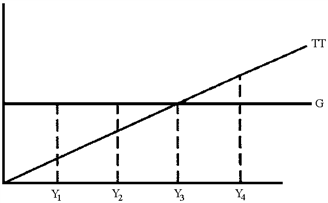Exam 32: Budget Deficits in the Short and Long Run
Exam 1: What Is Economics261 Questions
Exam 2: The Economy: Myth and Reality185 Questions
Exam 3: The Fundamental Economic Problem: Scarcity and Choice290 Questions
Exam 4: Supply and Demand: an Initial Look337 Questions
Exam 21: An Introduction to Macroeconomics216 Questions
Exam 22: The Goals of Macroeconomic Policy212 Questions
Exam 23: Economic Growth: Theory and Policy228 Questions
Exam 24: Aggregate Demand and the Powerful Consumer219 Questions
Exam 25: Demand-Side Equilibrium: Unemployment or Inflation216 Questions
Exam 26: Bringing in the Supply Side: Unemployment and Inflation228 Questions
Exam 27: Managing Aggregate Demand: Fiscal Policy210 Questions
Exam 28: Money and the Banking System224 Questions
Exam 29: Monetary Policy: Conventional and Unconventional210 Questions
Exam 30: The Financial Crisis and the Great Recession66 Questions
Exam 31: The Debate Over Monetary and Fiscal Policy219 Questions
Exam 32: Budget Deficits in the Short and Long Run215 Questions
Exam 33: The Trade-Off Between Inflation and Unemployment219 Questions
Exam 34: International Trade and Comparative Advantage226 Questions
Exam 35: The International Monetary System: Order or Disorder218 Questions
Exam 36: Exchange Rates and the Macroeconomy219 Questions
Exam 37: Contemporary Issues in the Us Economy23 Questions
Select questions type
A budget deficit will be least inflationary if the aggregate
(Multiple Choice)
5.0/5  (33)
(33)
Figure 32-1
 In Figure 32-1, there are four levels of income. G is government expenditures and TT is taxes less transfers. Y3 is the full-employment level of income. At Y3
In Figure 32-1, there are four levels of income. G is government expenditures and TT is taxes less transfers. Y3 is the full-employment level of income. At Y3
(Multiple Choice)
4.8/5  (37)
(37)
Because the personal income tax is an automatic stabilizer,
(Multiple Choice)
4.7/5  (35)
(35)
Deficit is the difference between government expenditures, which are either purchases or transfer payments and tax receipts.
(True/False)
4.8/5  (38)
(38)
Budget deficit is the amount by which the government's expenditures exceed its receipts during a specified period of time, usually a year.
(True/False)
4.8/5  (34)
(34)
If a budget deficit increases interest rates, it is possible that investment will
(Multiple Choice)
4.9/5  (31)
(31)
Under a balanced budget policy, a sharp rise in GDP will cause
(Multiple Choice)
4.7/5  (32)
(32)
The net national debt is smaller than the gross national debt because
(Multiple Choice)
4.9/5  (35)
(35)
As GDP falls, automatic stabilizers run the federal budget in a deficit direction.
(True/False)
4.9/5  (49)
(49)
Argentina in 2001 faced a debt problem more serious than the U.S. debt problem because Argentina was obligated to repay its debt in
(Multiple Choice)
4.8/5  (38)
(38)
Suppose that the economy is currently at full employment. All other things being equal, if the government implements expansionary fiscal policy, then the appropriate monetary policy is
(Multiple Choice)
4.8/5  (36)
(36)
Under a balanced budget policy, a sharp decline in GDP will cause
(Multiple Choice)
4.8/5  (41)
(41)
Why do economists think that the structural deficit is a good measure of the direction of fiscal policy?
(Multiple Choice)
4.7/5  (40)
(40)
Showing 201 - 215 of 215
Filters
- Essay(0)
- Multiple Choice(0)
- Short Answer(0)
- True False(0)
- Matching(0)